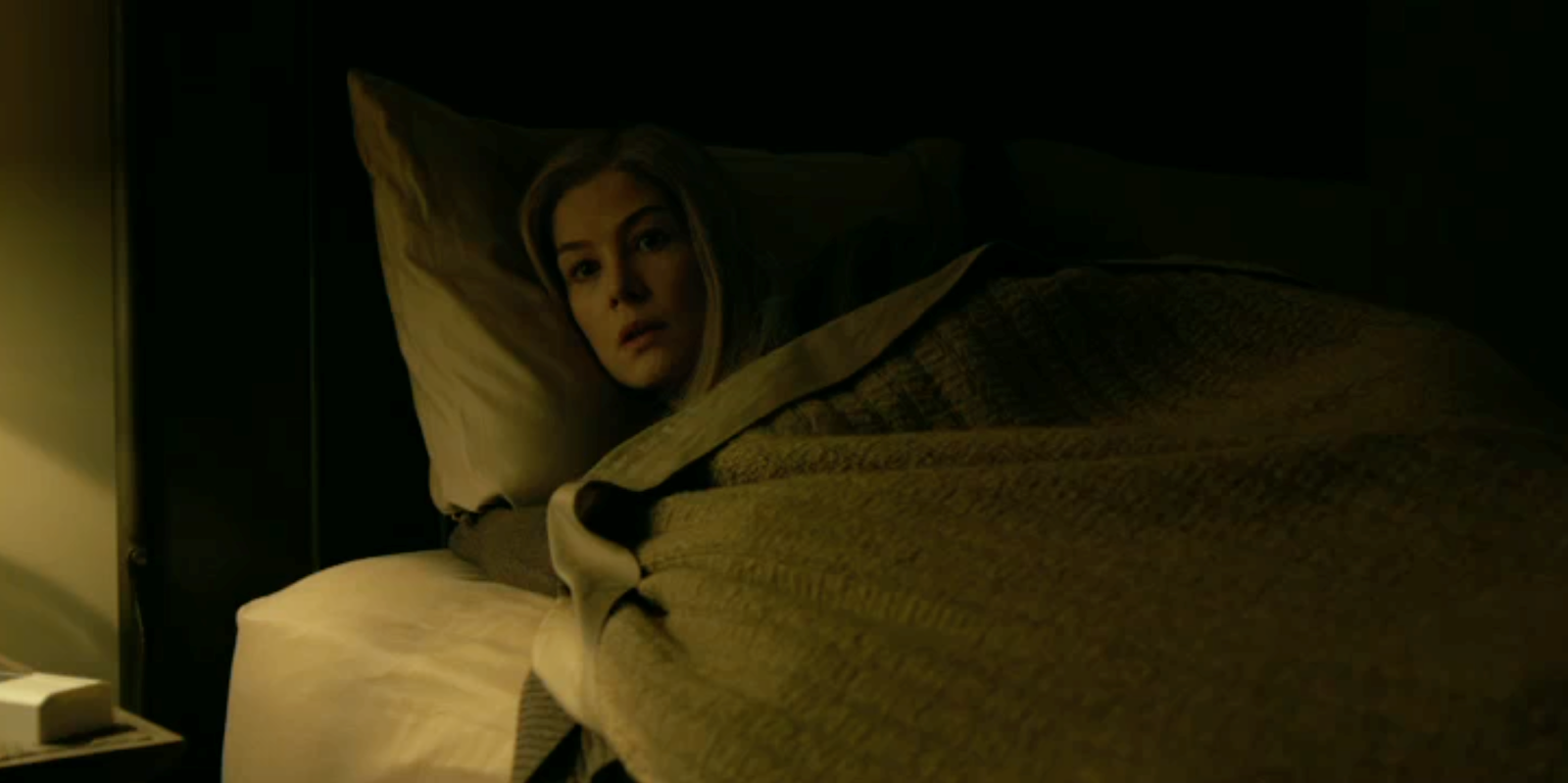Gone Girl, the intoxicating suburban noir about a woman who disappears on her fifth wedding anniversary, opens with a close-up of Amy Dunne’s head, blonde tresses immaculately resting on a man’s chest. She turns -- ghost-white skin, doll-perfect face -- and stares directly at us. There’s an eerily blank look behind her gorgeous eyes, piercing into us, begging us to read her mind. A voiceover by her husband, Nick, contemplates opening Amy’s perfect head and unspooling her brains to understand what she’s thinking. It’s a jarring and confrontational and elegantly bold way to open a movie; and by the time the film ends with an echo of this same shot, the unknowable look in Amy’s eyes will send shivers down your spine.
Fincher has always excelled at articulating the formless (Zodiac), at making the mundane feel extraordinary (The Social Network), at breathing life into the lifeless (The Curious Case of Benjamin Button). And in Gone Girl, Fincher seems to relish the causality of Amy’s disappearance. Everything in this world is connected -- a clue leads to a clue, a detail leads to an implication, a smile leads to an opinion, a kiss to a DNA swab. It quickly becomes clear Fincher isn’t interested in the mechanics of Amy Dunne’s disappearance (they barely hold up to basic logic, as several characters point out throughout) so much as the facades constructed by the individuals involved.
It is this deeper question of Who Are We as couples, as people, that Fincher and Flynn seek to explore. We quickly learn that Nick and Amy aren’t the perfect American couple that everyone thinks they are. They may not even be the people they made themselves out to be. But the strength of Flynn’s story comes in the preconceptions of these seemingly perfect East Coast-educated, Midwest-raised Americans; we should see them as archetypes of the perfect couple insofar as to give us the chance to shatter those molds. Gone Girl isn’t much of a mystery story -- either Amy is dead or she isn’t -- because it functions at a much higher level as a social deconstruction of the way people assume different personalities in order to please, manipulate, or entrap one another. Which version of yourself will you be when you date someone? When you’re around family? When you’re on TV? Who will you be five years later? Ten years later?
I have not yet read Flynn’s novel but I’m deeply intrigued by her worldview. Amy Dunne is obviously a proxy for Flynn -- a sensationalized, fictionalized, alter ego that may or may not reveal some of Flynn’s own desires. Amy, like Flynn, is a writer in New York who loses her job during the recession. There are multiple mentions of her parents’ success, her own trust fund, and the doting perception of Amy as the conduit for the successful books starring “Amazing Amy.” The implied motive behind Amy’s actions is her desire to construct the ultimate fairy tale; she needs to define herself -- escape from what the media, the job, the family want her to be -- by writing her own story. And who better to star in that story than her and her husband?
There have been some charges that Flynn’s story is misogynistic, that it only cares to present women as liars who resort to depraved acts -- e.g. fabricating rape charges -- in order to get what they want. But I think these claims miss the point of Flynn’s story. She clearly paints Amy as a villain, as someone snobby and spoiled and consequently, incapable of facing the real world through normal means. Amy contains, not unlike many real men and women, certain strengths to face the world as well as many shortcomings. She may be a liar and a morally empty character but there are, and should be, complex female villains who draw our ire more than our admiration. Who’s to say the evil mastermind orchestrating the traps can’t be a cunning but ruthless woman?
It seems almost unfair that Flynn’s darkly funny material was directed by Fincher, who I believe to be a cynic with a perversely sharp sense of humor. After a particularly bitter argument about the uselessness of marriage, Amy declares, “That’s marriage!” It’s a razor-sharp line that could stand as the film’s thesis statement as much as Fincher’s personal coup de grâce.
Given Fincher’s perfectionist standards, it's no surprise Gone Girl looks, sounds, and feels exquisite. Its every camera move, lighting setup, and syllable of dialogue (or sometimes lack of words) is crafted with a purpose towards revealing something deeper about human interactions beyond simply “Where’s Amy?” Cameras are often tilted just below eye level, enough to reveal the ominously constricting crown molding adorning the suburban homes as if each room were the most luxurious beige cage a middle-class American could hope for. Nick’s world is a drab collection of blues and greys when Amy disappears; Amy’s recounting of their early courtship is steeped in a golden hue. Even the film’s most gruesome scene is a morbidly elegant exercise in restraint, tempo, sound mixing, and compositions.
Alfred Hitchcock, perhaps the quintessential master of psychological horror, observed a simple rule: “Shoot your murder scenes like love scenes and your love scenes like murders.” I can’t imagine David Fincher tackling Gone Girl, a psychological horror lifted directly from Hitchcock’s portfolio, without abiding by this same rule. The film practically oozes trademark Hitchcock -- the unreliable narrator(s), the personality changes, the psychology of murder, and the idyllic Blonde. And yet, Fincher manages to spin author/screenwriter Gillian Flynn’s twisty narrative into something intrinsically his own, something slyly subversive but brilliantly entertaining. He bridges the tonal divide between killing the one you love and loving the you kill with such grace that I'm afraid of its ultimate takeaways regarding marriage and intimacy. Perhaps that's the point.

